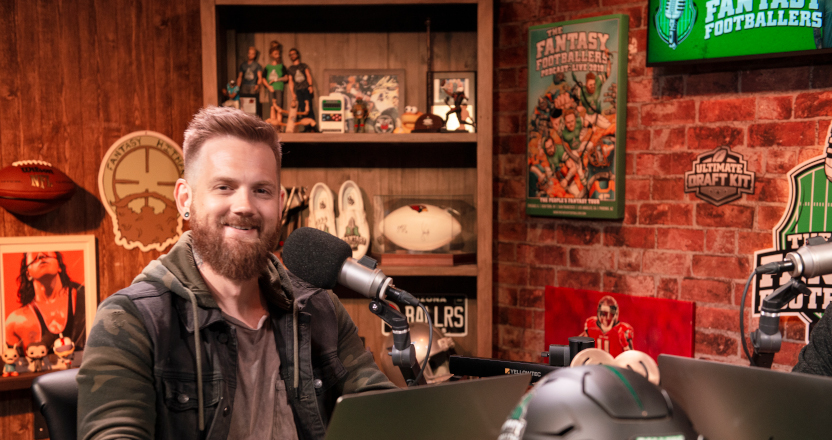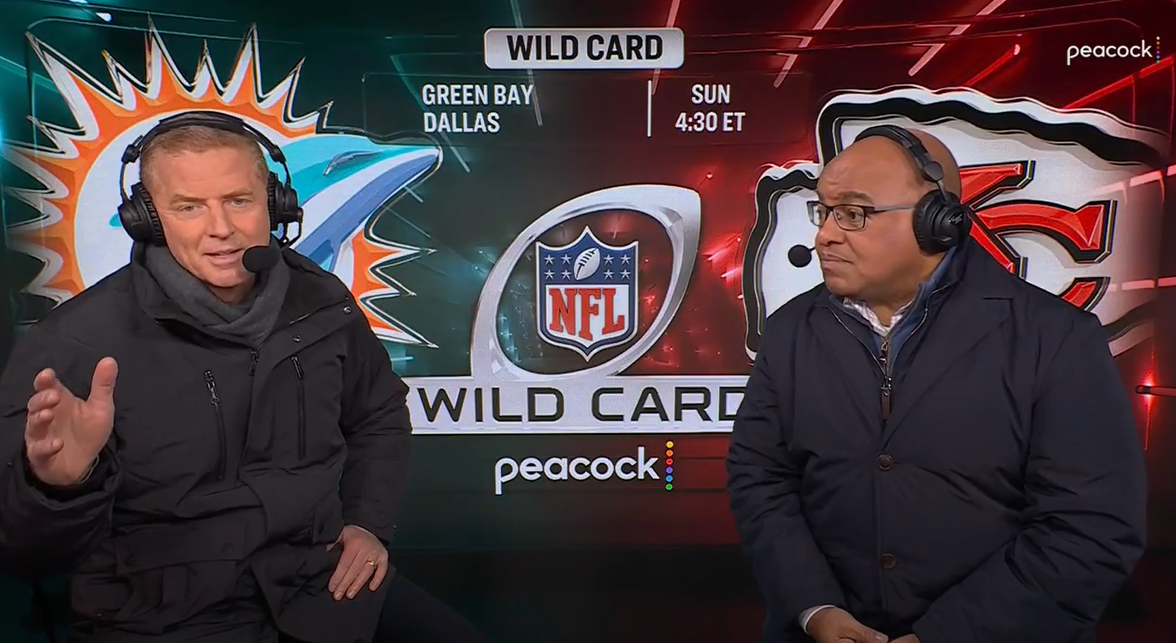Much of the discussion around sports podcasting is about podcasts from big companies. The Fantasy Footballers is an interesting exception there; hosts Mike Wright, Andy Holloway, and Jason Moore have been doing it on their own since 2014 (as a podcast in its current form; the origins date back a little further), and they’ve found a huge amount of success, regularly showing up in most-downloaded lists ahead of fantasy shows from much larger companies and signing deals like one for a new weekly show with Spotify Greenroom. They’ve also paid that success back, including with Holloway and his wife recently donation-matching more than $21,000 in donations to help orphaned, abused, and neglected children.
Wright recently took the time to speak to AA about the podcast, and said it all stems from a league at the former game-development company Moore ran, where he and Holloway were employed. The central league there started around 2007 or 2008, and Wright joined when it expanded in 2010. Wright said that league is still going strong (despite that company being long gone), and it was crucial to getting this podcast going.
“The true origin of the podcast is that we have our league of record that the three of us play in, myself, Andy, and Jason. The three of us used to work for a tech company, and Jason was actually my boss. We made Facebook games and iOS games. But we had this main fantasy football league, a keeper league, and we’re very passionate about this league.”
Wright (seen above in the podcast studio) said their league was known for its beyond-the-standard passion even before the podcast.
“We always try to take things up to the next level. It’s always a live draft, everyone’s always in the same room, people make t-shirts, people make banners for their team. The punishment for the last-place finisher, we have this dumb thing where we soak them with water and the draft’s freezing cold with air conditioning. And we would start bringing in friends, and they would wear suits, and we would have them announce our picks.”
And he said that passion led to him and Holloway launching a podcast about it.
“We were always like ‘How do we take the fun up to the next level?’ And Andy and I decided, ‘Once a week during lunch, let’s do a podcast, just for this league. So it was a podcast for 10 people besides us, just to evaluate what people had done. And we really just used it as a platform to talk garbage to other players in the league, which is such a huge part of fantasy football. So it was a lot of fun, and everyone in the league, of course it was going to be positive feedback, but it just felt like extra positive. People would look forward to it coming out. If we didn’t get it done on Tuesday, people are messaging us ‘Where’s the podcast?!'”
“So fantasy football was so important to us, and in any spare time at the job, we were talking fantasy football. And any time that we were supposed to be working, we were probably talking about fantasy football. And other people in the office were also in the league, so it consumed everybody.”
Wright said the amount of attention paid to their podcast internally convinced them to try and go wider, but that wasn’t an easy transition at first.
“And then we thought ‘Being in fantasy football would be cool. We already live and breathe it; imagine being in that space. We’re already doing this podcast, let’s give it a shot, let’s try and make a podcast for the public, for the world.’ So we made The Fantasy Footballers.”
“And in our first two episodes, we are just terrible, we are awful. All the fun and personality of the league podcast, it just got sucked right out of it. I guess we got nervous and got scared, ‘This is for the public, we have to act a certain way, I’ve got to feel like I have my jacket and tie on like I’m a sports broadcaster.’ We lost who we were. And we’re talking to Jason about it, and he’s like ‘This is nothing like the other one! The other one’s really fun!'”
Wright said the initial issues led to him and Holloway recalibrating, and to encouragement from Moore. And, amidst changes with the company, that led to them moving on from there, but bringing Moore into their new podcast venture.
“So we start fixing it. The show’s okay, but nobody’s listening to the show, it’s The Footballers at this point. And it’s kind of a funny foreshadowing: Jason tells Andy ‘Dude, I think this could be massive,’ and Andy tells Jason ‘Oh, it would be fun if it takes off,’ and Jason says ‘No, this show could be humongous.’ So we’re working on it a little bit, and as time goes on, Facebook’s changing a lot, all these things are changing a lot, and the tech company starts to go under. Everyone’s got to find a new job, and it’s like ‘Okay, what do we do?'”
“It’s January or something, and I start talking to Andy, and we’re deciding ‘Do we want to move forward with the podcast and keep going while everyone else is looking for a job?’ We eventually get to ‘Yes,’ and then we’re like ‘Hey, let’s bring Jason in.’ Jason is the funniest person I know, and he did work with The Groundlings in California, so his background is improv and theater, and he’s also a good fantasy football player. So he’d be a great third voice, he’s very funny, and we’re already great friends.”
Wright said the crucial key to their success was launching the revised at a seemingly “dead” point of the NFL calendar, following the 2014 Super Bowl.
“We decide to bring him on, and it’s sometime after the Super Bowl, and we’re having these meetings. And these meetings are taking place at like 11 p.m., because everyone has a day job and we all have three kids. So we’re trying to figure out when to fit this in. And we start saying ‘Okay, should we wait until June, training camp time when fantasy starts to lock in?'”
“And we decide ‘No, we’re going to make this show for us essentially, the show we would want to listen to.’ Because every year we would hit February/March, the NFL would be done, and all the fantasy football coverage would go away. And we wanted to hear it non-stop. So we decided ‘Okay, let’s be a year-round show, let’s do it, let’s turn the mics on.'”
“So we do that in February or March, we start recording episodes, and a couple people here and there are starting to listen, we’re starting to gain traction. And then June hits and we see this absolute explosive influx of listeners. And then the decision has to be made; ‘Holy crap, guys, with this amount of listeners, if we run this as a business, I think we can actually do this.’ But to do that, you have to push everything in, you have to be 100 percent in. And come August, we were going to do five shows a week, and treat this as our full-time job. And we got the blessing from all of our families, and we went for it.”
Wright said they saw strong listener numbers right from the start, but that wasn’t necessarily translating into revenue, something that was made harder by their independent status.
“And the listeners were there, but at the start, business-wise, it was tough. It was tough trying to scrape together [sponsorships]. It was ‘Okay, we’ve got another month, we’ve got another month of enough money for everyone that everyone can pay their rent, everyone can feed their families, we’re good. Let’s figure out the next month.’ And we kept pushing forward, and eventually everything starts coming together; the listeners were there, the business was working. And that was seven or eight years ago now.”
Wright said he’s still somewhat amazed that this has turned into a career for them.
“It’s an unbelievable story. And the position we’re in, we frequently reflect on that, going ‘Guys, this is insane that three dudes up in a bedroom are doing this.’ We converted one of Andy’s children’s rooms, that became our studio, and it’s Arizona, so it’s 100 bajillion degrees outside, and it’s three super sweaty guys in one tiny room. And we went from that to the office that we’re in now, with multiple full-time employees and things. It’s still crazy when we really reflect on where we were and what we’ve now become.”
While the company their league started at is no longer around in its current form, Wright said that league is still going strong, and that’s part of what makes their podcast different.
“That’s still our main league. I think part of the connection we get with our fans is #1, we’re three friends who already have that natural friendship, we’re not employees put in a room, and #2, we care so much about winning our league. Even if we tried not to let that come out in the show, we were going to be unable to stop it.”
He said one of their most memorable moments came from a dramatic shift in that league.
“We do a dumb fake award show every year, we call them the Footies, and there are awards for certain players, but also awards that are very show-specific. There was one week where Jason was playing Andy, I believe. And he’s winning, and then Philip Rivers throws a ridiculous interception at the end of the game, and he loses. And it won the moment of the year, because Jason was so thoroughly depressed, much to the delight of everyone else. The love and the passion that we have for the game and for our league, I think that is a huge connection point for our audience.”
A podcast with this kind of success has obviously had opportunities to join bigger companies or networks over the years, but The Fantasy Footballers hasn’t done that. Wright said independence is still an advantage for them, especially in how quickly it allows them to address new opportunities.
“We’re responsible for all the decisions, all the creative, taking any feedback. And I think that has helped. We are 100 percent us on the show, and that helps us connect with the listenership. And when you’re independent, you can be so nimble. We’re not the giant ship, we’re the tiny little speedboat. When an opportunity arises to work with someone, it’s like ‘Okay, let’s knock this out.’ We don’t have a giant legal team. It’s like ‘Let’s figure this out.’ So those types of things have been very beneficial to us.”
The latest
- Could NFL see next Saudi sportswashing controversy?
- ESPN and NBA have reportedly ‘essentially come to terms’ on deal that would keep Finals on ABC
- G/O Media sells The Onion to ‘Global Tetrahedron,’ ex-NBC reporter Ben Collins to serve as CEO
- Eli Gold on Alabama exit: ‘You can’t argue with city hall.’
“And the three of us hosts, we are the checks and balances of the show. It’s nice that there are three of us; we usually agree on things, but every once in a while, it’s two out of three. It really helps keep us pointed north.
He said there are big advantages to remaining independent, too, as they’re doing this for themselves and embracing flexibility, rather than trying to maximize corporate profits.
“We take vacations when we want to take vacations. If we’re sick, we stay home sick. We put family and life first here. It’s a great culture to be a part of and it helps guide that. That’s something that’s made me happy about being independent.”
This year was an interesting time to speak to Wright, as they were coming off perhaps the strangest fantasy football season in memory due to all the COVID-19 issues during the 2020-21 NFL season. He said that did present a lot of challenges, especially when it wasn’t clear the NFL was going to go ahead with a season.
“Last year was definitely a struggle. This is obviously my own personal side of it; a lot of people have it far worse than us. But the timeline, in April, May, everything shut down, it really seemed like we were going to be okay, and then we started getting into June and July and going ‘Holy crap, are we going to have a football season? And if we don’t have a football season, what does that mean for our business?’ We have many, many families that depend on football, and on us to take care of everyone.”
“So July last year was terrifying, feeling like it wasn’t going to happen. Even though it’s the NFL, if anybody’s going to make it happen, they’re just going to push through no matter what the circumstances are because they’re the $80 billion NFL.”
Wright said while the NFL’s decision to proceed alleviated some of the stress, there were still issues with what happened when players or even whole teams were wiped off the normal schedules thanks to positive COVID-19 tests. He said their particular league and their podcast erred on the side of making it as easy as possible for those running teams.
“And then it was ‘Okay, how are we going to handle COVID?’ We had a lot of people reaching out of ‘What are we going to do here?’ And we had made some guidelines of what we thought we were going to do with our league, like ‘if a player goes on the COVID IR, we’ll make a note; this person is still on your team, but you can drop them or do whatever.'”
“We strategically made these off-book decisions, not programmed into the system or anything, it was all off-book rules. Our stance was ‘This sucks. It’s going to have an impact, but let’s minimize the impact that it can have on your fantasy football team, because fantasy football, this is fun.’ So anything we could do to minimize the impact of COVID, that’s how we handled it.”
And Wright said while COVID reschedulings impacted some individual weeks, he didn’t think they were a huge problem with the season overall.
“When there were things like the Titans’ outbreak and they had to reschedule a game, it certainly impacted some things, but I think everyone did the best they could, and by the end of the year, I don’t think anybody was looking back at the season going ‘I lost specifically because of COVID.’ So that was a little bit of luck, I guess, that they were able to run it as smooth as they did.”
As for The Fantasy Footballers, Wright said they’re hoping for more growth, but growth will need to come in a way that works for them.
“We’ll keep growing, keep trying to expand the listenership. Up in our room, we have, it’s super corny but we love it because we’re super corny dudes. It’s a sign, it’s an anagram that stands for Remember Why You Do This And Remember How You Got Here, but just the letters. We have that up in the office in clear view so it catches your eyes.”
“So while you can have the dreams of ‘Man, what if we did this, and what if we did this?’, we’re always checking those aspirations with ‘Is that good for this business? Is that good for us as people? Is that good for our families?’ Looking forward, we always make sure we’re doing what is right for our families and the other families. And if we’re frozen in time and we’re just cruising along where we are right now, we’re all going to have a good life.”





